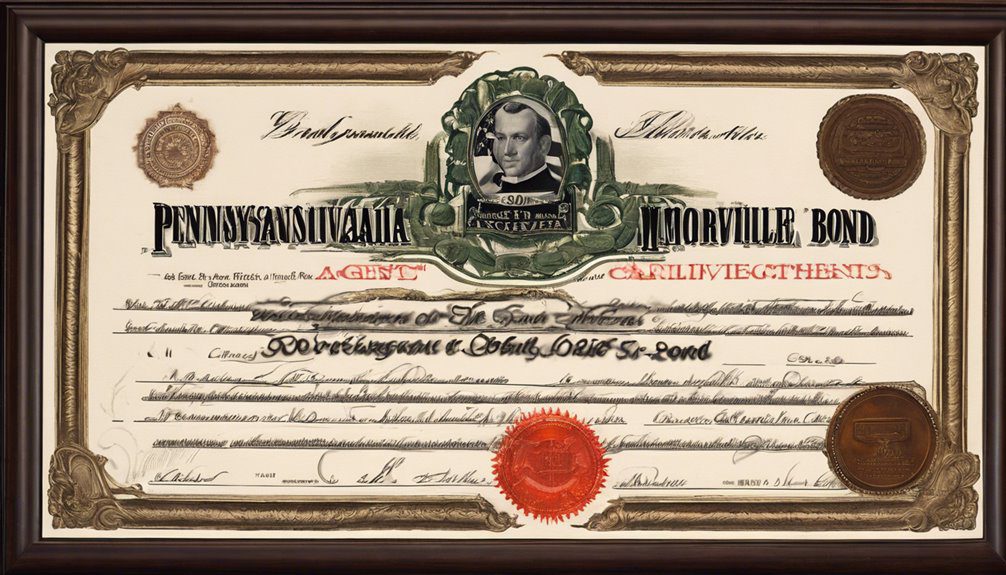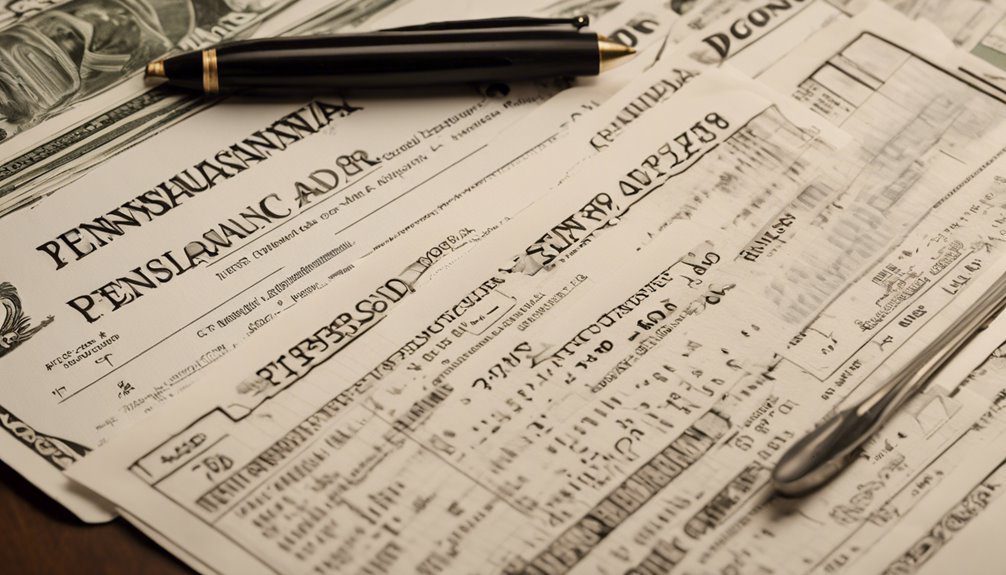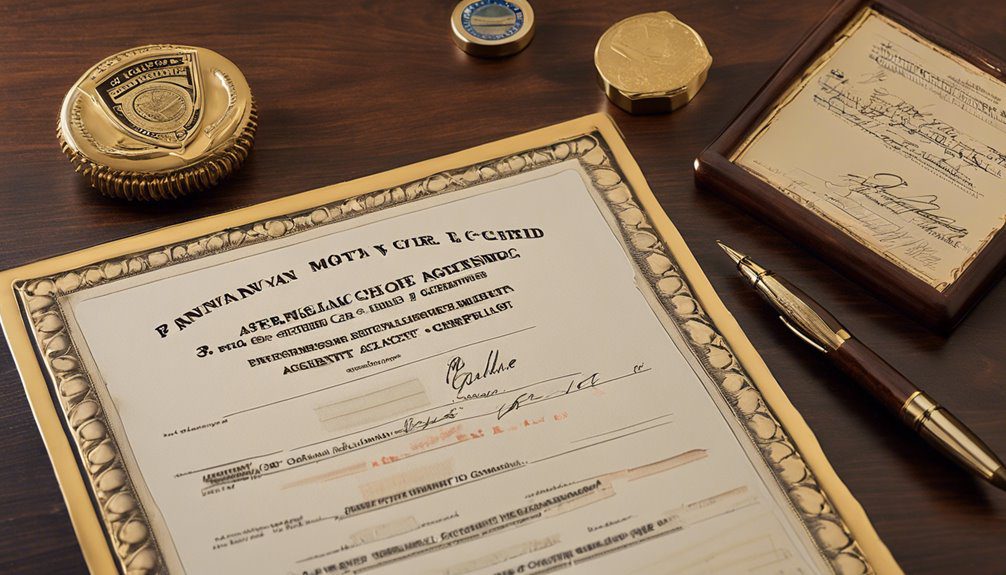If you're considering becoming a Pennsylvania Motor Vehicle Card Agent, you need to understand the significance of the $3,000 bond. This bond isn't just a regulatory formality; it serves as a critical safety net for consumers and enhances your credibility in the industry. You might be wondering about the specific requirements and implications this bond entails for your practice. Knowing how to navigate these aspects can be vital for your success in the field, especially if you want to avoid potential pitfalls. What steps should you take next to ensure compliance and build trust?
Overview of the Bond

Understanding the Pennsylvania Motor Vehicle Card Agent Bond is essential for anyone looking to operate as a card agent in the state. This bond serves as a financial guarantee that you'll adhere to the laws and regulations governing the motor vehicle industry in Pennsylvania.
When you secure this bond, you're essentially promising to act ethically and responsibly in your role as a card agent. The bond amount is typically set at $3,000, which reflects your commitment to comply with relevant statutes.
It's crucial to note that this bond protects the public, ensuring that any financial losses resulting from your actions as a card agent can be compensated. If you fail to fulfill your obligations, claimants can seek restitution through the bond, which can cover damages up to the bond amount.
To obtain this bond, you'll need to work with a surety company. They'll assess your financial standing and may require documentation to evaluate your risk. Illinois Surety Bonds provide similar protections in other states, ensuring compliance and financial security.
Once approved, you'll receive the bond, which you must maintain throughout your card agent operations. Staying informed about any updates to bond requirements is also vital for ongoing compliance.
Purpose of the ,000 Bond
The $3,000 Pennsylvania Motor Vehicle Card Agent Bond serves a key purpose in safeguarding both the public and the integrity of the motor vehicle industry. By securing this bond, you're committing to act ethically and responsibly in your role as a card agent.
This bond protects consumers from potential fraud or misrepresentation, ensuring that you provide accurate information and services related to vehicle registration and licensing. If you fail to fulfill your duties or engage in dishonest practices, the bond provides a financial safety net for affected parties. They can seek compensation for losses incurred due to your actions, which helps maintain trust in the system.
Moreover, having this bond reinforces your credibility, signaling to clients and regulatory bodies that you're a reliable professional. This bond also encourages agents to comply with state laws and regulations. When you're aware that your actions could lead to financial repercussions, it's more likely you'll adhere to the rules governing your profession. Additionally, the bond amount reflects the financial risk associated with the bond, which is crucial for protecting public interests in the motor vehicle industry.
In essence, the $3,000 bond isn't just a requirement; it's a commitment to uphold high standards in the motor vehicle industry, benefiting everyone involved.
Requirements for Agents

To become a Pennsylvania Motor Vehicle Card Agent, you need to meet specific requirements that ensure you're qualified to handle vehicle registration and licensing tasks.
First, you must be at least 18 years old and possess a valid Pennsylvania driver's license. This helps establish your credibility and understanding of state vehicle laws.
Next, you'll need to complete a training program approved by the Pennsylvania Department of Transportation. This program covers essential topics, including registration procedures, licensing regulations, and customer service skills.
Upon completion, you'll receive a certificate that you'll need to present during the application process.
It's also important to undergo a background check. This ensures that you have no criminal history that could affect your ability to perform your duties responsibly.
In addition, you'll need to provide proof of a physical location where you'll conduct your business as an agent, along with ensuring that your business complies with local zoning laws.
How to Obtain the Bond
Obtaining the Pennsylvania Motor Vehicle Card Agent Bond is a crucial step in your journey to becoming an agent. First, you'll need to find a surety company that's authorized to issue bonds in Pennsylvania. Research various providers, as they can differ in terms of service and requirements.
Once you've selected a surety company, you'll fill out an application. This might involve providing personal information, professional background, and details about your business. The surety company will assess your creditworthiness, as this can affect your eligibility and bond terms.
After your application is approved, you'll receive a quote for the bond amount, which is typically $3,000. Make sure you review the terms carefully before proceeding. You'll then need to pay the premium, which is usually a percentage of the bond amount. Bond costs vary based on factors such as credit score and financial stability, so it's important to understand how these might affect your situation.
Once payment is made, the surety will issue your bond. Make sure to keep a copy for your records.
Lastly, submit the bond to the Pennsylvania Department of Transportation as part of your agent requirements. Completing these steps efficiently will help you secure your bond and move forward in your new role as a motor vehicle card agent.
Costs Associated With the Bond

When considering the costs associated with the Pennsylvania Motor Vehicle Card Agent Bond, it's essential to understand that the premium you'll pay is typically a percentage of the bond amount, which is usually set at $3,000.
This percentage varies based on several factors, including your credit score, financial history, and the bonding company you choose.
Generally, you can expect to pay anywhere from 1% to 10% of the bond amount as your premium. For instance, if your premium is 3%, you'd pay $90 annually for the bond.
It's a good idea to shop around and compare quotes from different surety bond providers to find the best rate.
Keep in mind that some companies may offer lower premiums based on your qualifications, while others might have additional fees, like processing or renewal charges.
Also, if you require the bond for a longer period, you might pay a higher upfront cost.
It's crucial to read the fine print and understand all associated fees before making a decision, ensuring you know exactly what you'll owe throughout the bond's duration. Additionally, understanding the types of surety bonds can help you better navigate your options and obligations.
Implications for Consumers
Understanding the costs of the Pennsylvania Motor Vehicle Card Agent Bond can have significant implications for consumers. When you engage with a card agent, you're relying on their ability to manage your vehicle registration and title transactions efficiently and legally.
The bond serves as a financial safety net, ensuring that you're protected against potential misconduct or negligence by the agent. If the agent fails to fulfill their obligations, the bond can cover your losses up to the bond amount. This security gives you peace of mind, knowing that you have recourse if something goes wrong.
However, if the bond isn't maintained properly, you might face delays or complications in your vehicle transactions. Additionally, the cost of the bond can affect the fees that agents charge you for their services. If agents face higher bonding costs, they might pass those expenses on to you, which could influence your overall budget for vehicle-related services.
Ultimately, being aware of these implications helps you make informed decisions when choosing a motor vehicle card agent, ensuring you prioritize both cost-effectiveness and reliability in your transaction processes.
Maintaining Compliance as an Agent

Maintaining compliance as a motor vehicle card agent is essential for ensuring smooth operations and building trust with your clients. To achieve this, you need to stay updated on state regulations and requirements. Regularly review the Pennsylvania Department of Transportation's guidelines to ensure you're following the latest rules.
You should also keep accurate records of all transactions and client interactions. This not only helps in case of audits but also builds a transparent relationship with your clients. Make sure all documents are properly filled out and submitted on time to avoid penalties.
Furthermore, consider investing in ongoing training. This can enhance your knowledge and skills, enabling you to provide better service while remaining compliant. Networking with other agents can also be beneficial; sharing experiences and best practices can help you navigate challenges more effectively.
Lastly, maintain your $3,000 bond and ensure it's renewed on time. This bond protects your clients and demonstrates your commitment to compliance. Additionally, understanding the requirements and regulations surrounding your bond can further solidify your operational integrity.
Conclusion
In conclusion, the Pennsylvania Motor Vehicle Card Agent $3,000 Bond is essential for your credibility and compliance in the industry. By securing this bond, you not only protect yourself from potential liabilities but also build trust with your clients and the public. Remember, maintaining compliance is key to your success as an agent. Stay informed about your obligations, and you'll contribute to a more trustworthy motor vehicle services sector while safeguarding your professional reputation.


